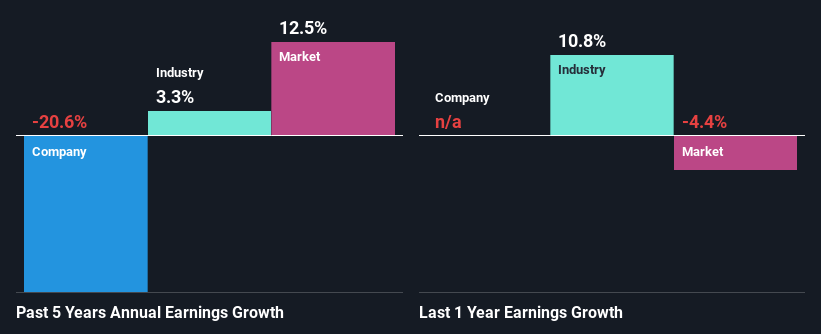- Malaysia
- /
- Infrastructure
- /
- KLSE:AIRPORT
Can Malaysia Airports Holdings Berhad (KLSE:AIRPORT) Performance Keep Up Given Its Mixed Bag Of Fundamentals?

Malaysia Airports Holdings Berhad's (KLSE:AIRPORT) stock is up by 8.3% over the past three months. However, we decided to study the company's mixed-bag of fundamentals to assess what this could mean for future share prices, as stock prices tend to be aligned with a company's long-term financial performance. In this article, we decided to focus on Malaysia Airports Holdings Berhad's ROE.
ROE or return on equity is a useful tool to assess how effectively a company can generate returns on the investment it received from its shareholders. In simpler terms, it measures the profitability of a company in relation to shareholder's equity.
See our latest analysis for Malaysia Airports Holdings Berhad
How To Calculate Return On Equity?
Return on equity can be calculated by using the formula:
Return on Equity = Net Profit (from continuing operations) ÷ Shareholders' Equity
So, based on the above formula, the ROE for Malaysia Airports Holdings Berhad is:
8.0% = RM615m ÷ RM7.7b (Based on the trailing twelve months to September 2023).
The 'return' refers to a company's earnings over the last year. One way to conceptualize this is that for each MYR1 of shareholders' capital it has, the company made MYR0.08 in profit.
What Has ROE Got To Do With Earnings Growth?
Thus far, we have learned that ROE measures how efficiently a company is generating its profits. Depending on how much of these profits the company reinvests or "retains", and how effectively it does so, we are then able to assess a company’s earnings growth potential. Assuming all else is equal, companies that have both a higher return on equity and higher profit retention are usually the ones that have a higher growth rate when compared to companies that don't have the same features.
A Side By Side comparison of Malaysia Airports Holdings Berhad's Earnings Growth And 8.0% ROE
On the face of it, Malaysia Airports Holdings Berhad's ROE is not much to talk about. Yet, a closer study shows that the company's ROE is similar to the industry average of 8.0%. Having said that, Malaysia Airports Holdings Berhad's five year net income decline rate was 21%. Remember, the company's ROE is a bit low to begin with. Hence, this goes some way in explaining the shrinking earnings.
That being said, we compared Malaysia Airports Holdings Berhad's performance with the industry and were concerned when we found that while the company has shrunk its earnings, the industry has grown its earnings at a rate of 3.3% in the same 5-year period.

Earnings growth is an important metric to consider when valuing a stock. What investors need to determine next is if the expected earnings growth, or the lack of it, is already built into the share price. This then helps them determine if the stock is placed for a bright or bleak future. Is AIRPORT fairly valued? This infographic on the company's intrinsic value has everything you need to know.
Is Malaysia Airports Holdings Berhad Using Its Retained Earnings Effectively?
Malaysia Airports Holdings Berhad's low three-year median payout ratio of 14% (or a retention ratio of 86%) over the last three years should mean that the company is retaining most of its earnings to fuel its growth but the company's earnings have actually shrunk. The low payout should mean that the company is retaining most of its earnings and consequently, should see some growth. So there might be other factors at play here which could potentially be hampering growth. For instance, the business has faced some headwinds.
Moreover, Malaysia Airports Holdings Berhad has been paying dividends for at least ten years or more suggesting that management must have perceived that the shareholders prefer dividends over earnings growth. Looking at the current analyst consensus data, we can see that the company's future payout ratio is expected to rise to 46% over the next three years. Regardless, the future ROE for Malaysia Airports Holdings Berhad is speculated to rise to 11% despite the anticipated increase in the payout ratio. There could probably be other factors that could be driving the future growth in the ROE.
Summary
In total, we're a bit ambivalent about Malaysia Airports Holdings Berhad's performance. While the company does have a high rate of reinvestment, the low ROE means that all that reinvestment is not reaping any benefit to its investors, and moreover, its having a negative impact on the earnings growth. Having said that, looking at current analyst estimates, we found that the company's earnings growth rate is expected to see a huge improvement. Are these analysts expectations based on the broad expectations for the industry, or on the company's fundamentals? Click here to be taken to our analyst's forecasts page for the company.
If you're looking to trade Malaysia Airports Holdings Berhad, open an account with the lowest-cost platform trusted by professionals, Interactive Brokers.
With clients in over 200 countries and territories, and access to 160 markets, IBKR lets you trade stocks, options, futures, forex, bonds and funds from a single integrated account.
Enjoy no hidden fees, no account minimums, and FX conversion rates as low as 0.03%, far better than what most brokers offer.
Sponsored ContentNew: Manage All Your Stock Portfolios in One Place
We've created the ultimate portfolio companion for stock investors, and it's free.
• Connect an unlimited number of Portfolios and see your total in one currency
• Be alerted to new Warning Signs or Risks via email or mobile
• Track the Fair Value of your stocks
Have feedback on this article? Concerned about the content? Get in touch with us directly. Alternatively, email editorial-team (at) simplywallst.com.
This article by Simply Wall St is general in nature. We provide commentary based on historical data and analyst forecasts only using an unbiased methodology and our articles are not intended to be financial advice. It does not constitute a recommendation to buy or sell any stock, and does not take account of your objectives, or your financial situation. We aim to bring you long-term focused analysis driven by fundamental data. Note that our analysis may not factor in the latest price-sensitive company announcements or qualitative material. Simply Wall St has no position in any stocks mentioned.
About KLSE:AIRPORT
Malaysia Airports Holdings Berhad
An investment holding company, engages in the development, management, operation, and maintenance of airports.
Solid track record with moderate growth potential.
Similar Companies
Market Insights
Community Narratives




